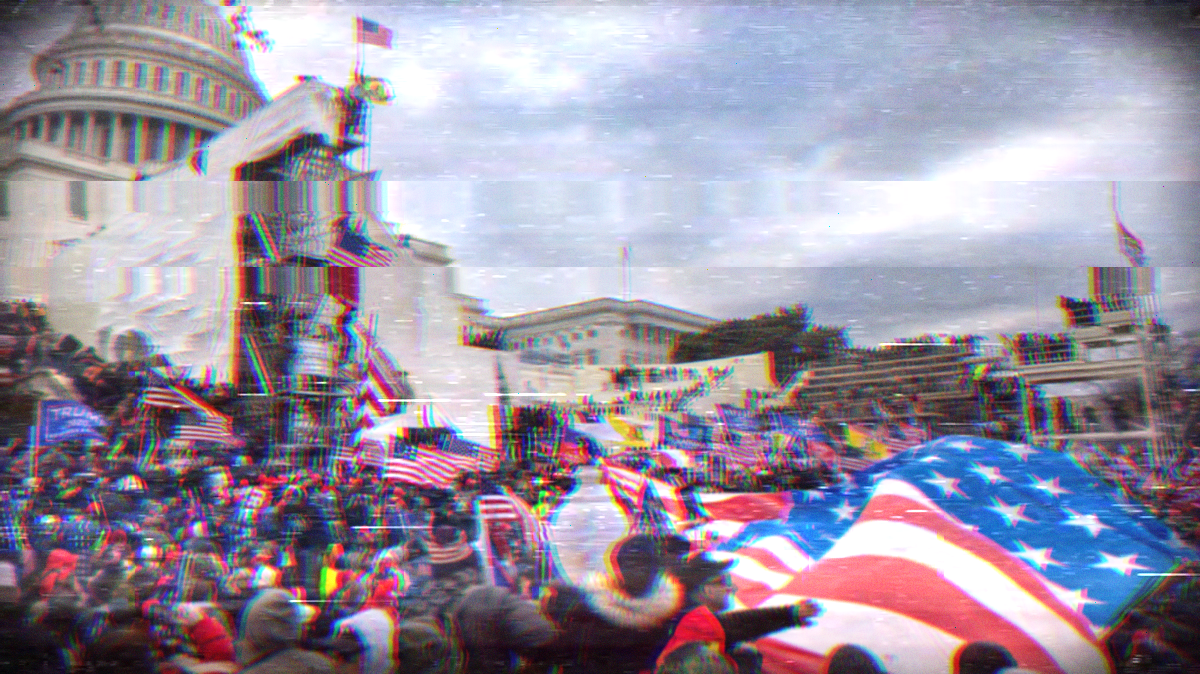Revisiting the idiotic decision to ban Donald Trump off Twitter and what it means for the future of democracy that private companies started to influence public discourse like that and got away with it.
Welcome to another episode of The Private Citizen, a civil liberties podcast! The regular audio version of the episode is embedded above and you can subscribe to the show with the buttons in the sidebar or by following the instructions on this page. There’s also a video version of this episode available on YouTube:
Why Donald Trump Was Banned by Twitter
As promised, I’m going back to the Twitter Files. In this episode, we are looking at how and why Donald Trump was banned off Twitter. Not because I like or support Trump, but because it was obviously a mistake (I said so at the time) and paved the way for a new era of censorship in which the state uses private companies to do its dirty work.
You might think all of this is old news, but I feel it is a very important part of history that must be discussed. And since I haven’t gotten around to this specific reporting before, I’m doing it here and now.
The Nerds Get a Hold of Unprecedented Power
Whatever your opinion on the decision to remove Trump that day, the internal communications at Twitter between January 6th-January 8th have clear historical import. Even Twitter’s employees understood in the moment it was a landmark moment in the annals of speech. As soon as they finished banning Trump, Twitter execs started processing new power. They prepared to ban future presidents and White Houses – perhaps even Joe Biden.
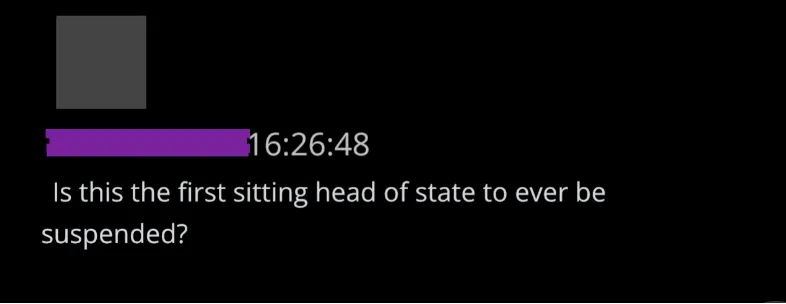
This internal Twitter decision is actually the beginning of a new era: A brave new world, where private companies actually exert direct power over their government. Don’t mistake what happened here: The internal management of a private company decided to censor an official communication channel (and maybe the most important one) of their own head of state.
The problem is that this happened to Trump. It would be wholly unacceptable had it happened to anyone else, but because it happened to the Evil Orange Man, it is now the new normal.
As the election approached, senior executives – perhaps under pressure from federal agencies, with whom they met more as time progressed – increasingly struggled with rules, and began to speak of “vios” as pretexts to do what they’d likely have done anyway. After J6, internal Slacks show Twitter executives getting a kick out of intensified relationships with federal agencies.
This looks like it was the beginning of the whole censorship-industrial complex: the FBI starting to manipulate Twitter in the run-up of the 2020 election and intensifying that pressure after 6 January 2021. That was also my impression in episode 51 of this podcast from 13 January. In fact, as we have seen as the Twitter Files progressed, and as we will discuss in upcoming episodes, this was just one aspect of a movement that had been ongoing behind the scenes and affected pretty much all of social media – and other internet sites beyond, like Wikipedia – for a while.
The reason we learned about Twitter first – and the reason we learned about this government / private sector conspiracy at all – is because Twitter’s new owner, Elon Musk, is so unorthodox and, probably, a bit mad. And yes, I am calling this a conspiracy. Because that is what it was: government agencies and private companies acting against the public interest in secret. That’s pretty much the definition of what a conspiracy is.
There was at least some tension between Safety Operations – a larger department whose staffers used a more rules-based process for addressing issues like porn, scams, and threats – and a smaller, more powerful cadre of senior policy execs like Roth and Gadde. The latter group were a high-speed Supreme Court of moderation, issuing content rulings on the fly, often in minutes and based on guesses, gut calls, even Google searches, even in cases involving the President. During this time, executives were also clearly liaising with federal enforcement and intelligence agencies about moderation of election-related content.
If we were talking about a government, and not a company, this would be called authoritarianism. Ignoring your own rules in favour of what a group of powerful people believes to be right and acting on that has been a defining feature of every autocratic regime from classical antiquity, though medieval monarchs up to the horrible realities of Nazi Germany and the Soviet Union. The new twist is that the state is using a private company to outsource these proceedings to keep a just and democratic face while injustice is going on.
This post about the Hunter Biden laptop situation shows that Roth not only met weekly with the FBI and DHS, but with the Office of the Director of National Intelligence (DNI).
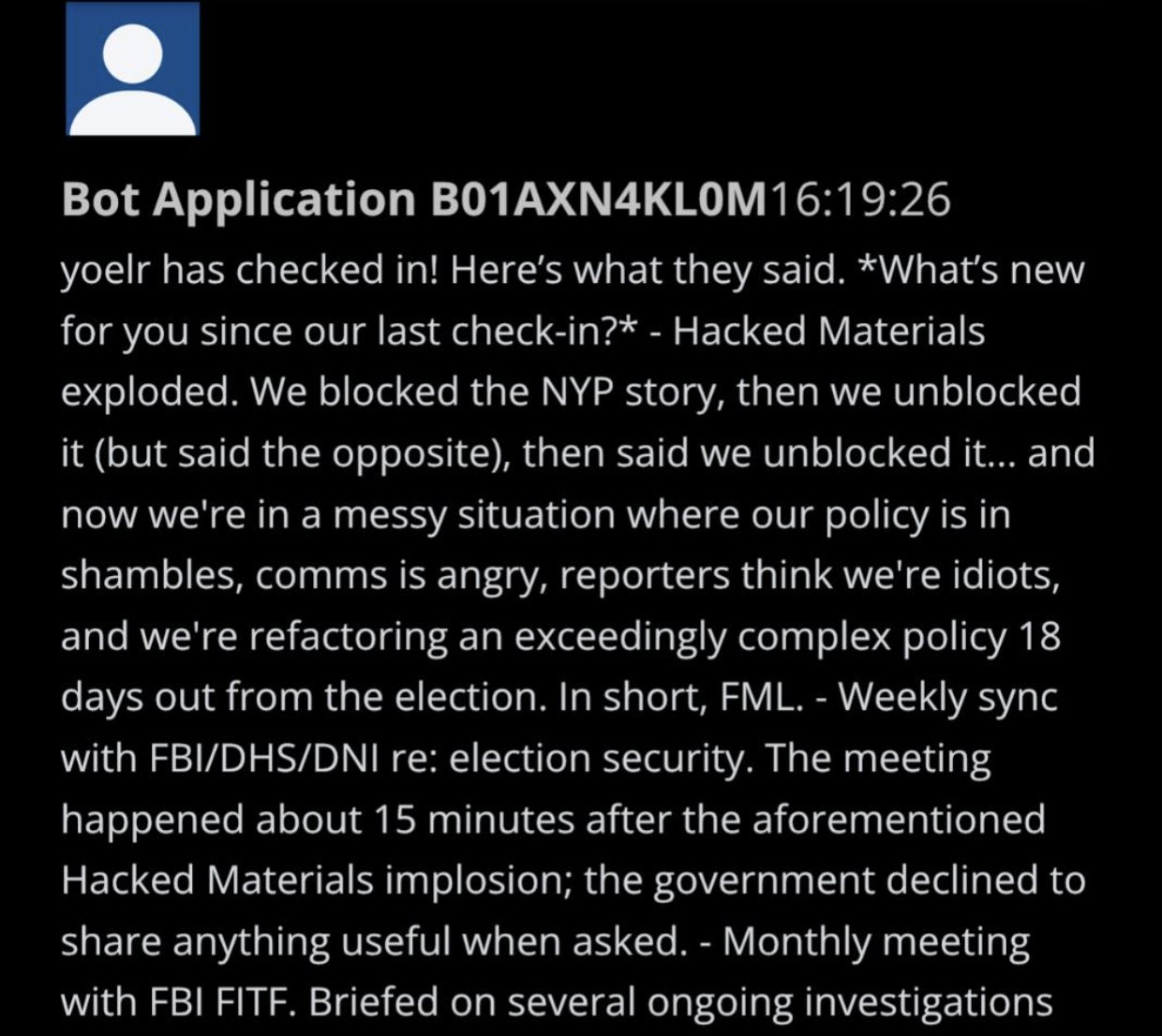
Weekly meetings with several intelligence services. How is this normal for a social media company? There were probably meeting more with the government than at companies who build weapons systems for the military!
Humourless Bureaucrats Meddling in Election Reporting
In one case, former Arkansas governor Mike Huckabee joke-tweets about mailing in ballots for his “deceased parents and grandparents.”
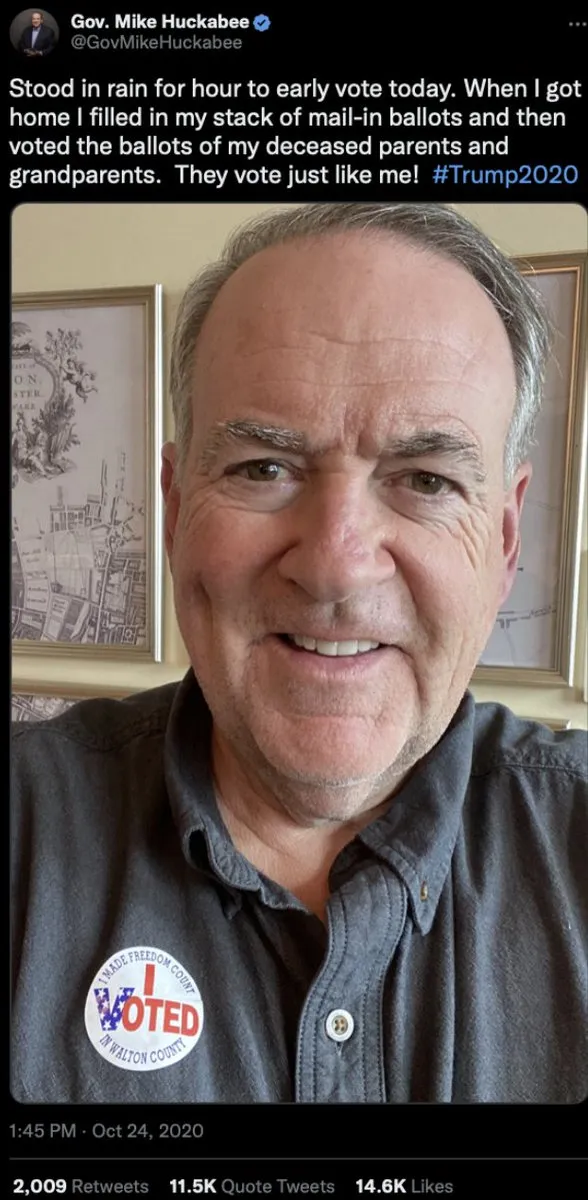
This inspires a long Slack that reads like an parody. “I agree it’s a joke,” concedes a Twitter employee, “but he’s also literally admitting in a tweet a crime.”
This comment is idiotic. If it is obvious that it’s a joke, it can hardly be a crime. Goes to show how bad the people in charge at Twitter where when it comes to logical thinking. Which seems to be a very common problem in management everywhere.
Anybody who’s ever worked at a company knows how clueless many managers are about all kinds of things – often the most important things. These are not the people who should be deciding on what is considered a fact; or on the fates of democratically-elected government. But in this case, they did.
The group declares Huck’s an “edge case,” and though one notes, “we don’t make exceptions for jokes or satire,” they ultimately decide to leave him be, because “we’ve poked enough bears."
“Could still mislead people… could still mislead people,” the humor-averse group declares, before moving on from Huckabee. Roth suggests moderation even in this absurd case could depend on whether or not the joke results in “confusion.” This seemingly silly case actually foreshadows serious later issues.
In the docs, execs often expand criteria to subjective issues like intent (yes, a video is authentic, but why was it shown?), orientation (was a banned tweet shown to condemn, or support?), or reception (did a joke cause “confusion”?). This reflex will become key in J6.
In a less humorous development, the FBI (an intelligence service), was getting involved in reporting on the ongoing election.
Here, the FBI sends reports about a pair of tweets, the second of which involves a former Tippecanoe County, Indiana Councilor and Republican named claiming “Between 2% and 25% of Ballots by Mail are Being Rejected for Errors.”
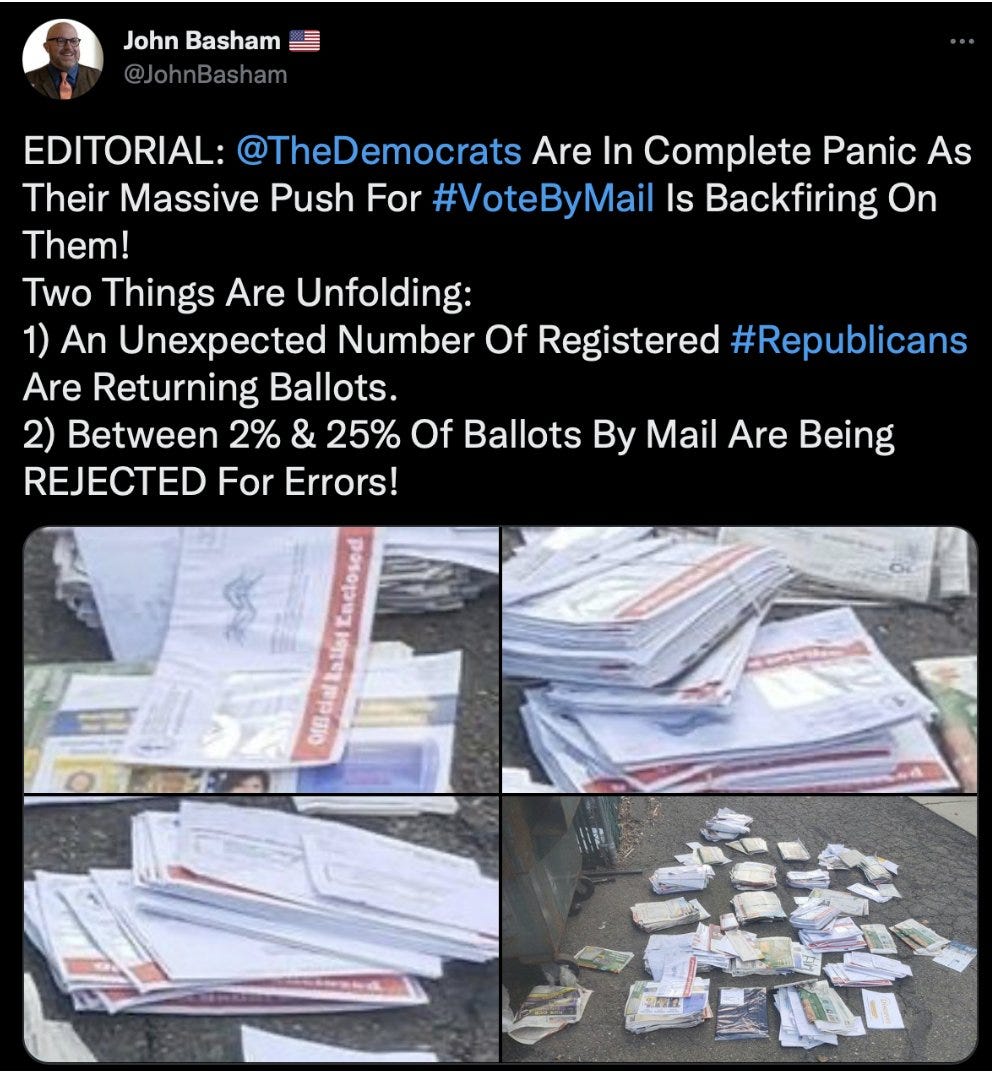
The group then decides to apply a “Learn how voting is safe and secure” label because one commenter says, “it’s totally normal to have a 2% error rate.” Roth then gives the final go-ahead to the process initiated by the FBI.
I realise that the state of elections in the US is catastrophic – I have reported on this since the second episode of this show – but just assuming that a 2% error rate on mail-in ballots is normal seems insane to me.
Or at least it did initially. It turns out that in Germany, where we’ve been doing mail-in ballots for ages and it has become the de-facto way to vote for many people (47.3% of all voters in the Federal Election of 2017 voted by mail), the rate is even higher and might even be up to 4%. But, in stark contrast to the Twitter executives, the academic paper which I’ve got this number from argues that this is not normal and shouldn’t be seen as such. Its authors seem convinced that this is a problem voters should be made aware of. Very much like that Indiana official whose tweet was flagged by the FBI.
I guess in future, this academic paper would also be suppressed on account of the truth being too much for the poor voters to bear.
Doing the Thing You Know Is Wrong, but That You Want to Do Anyway
In the docs, execs often expand criteria to subjective issues like intent (yes, a video is authentic, but why was it shown?), orientation (was a banned tweet shown to condemn, or support?), or reception (did a joke cause “confusion”?). This reflex will become key in J6.
In another example, Twitter employees prepare to slap a “mail-in voting is safe” warning label on a Trump tweet about a postal screwup in Ohio, before realizing “the events took place,” which meant the tweet was “factually accurate”.
Trump was being “visibility filtered” as late as a week before the election. Here, senior execs didn’t appear to have a particular violation, but still worked fast to make sure a fairly anodyne Trump tweet couldn’t be “replied to, shared, or liked”.
This makes it obvious that this was a clear partisan exercise. This wasn’t about misinformation (propaganda) or protecting the public from dangerous lies. They were censoring factual information! It was clearly designed to prevent Trump from getting re-elected.
Twitter, in 2020 at least, was deploying a vast range of visible and invisible tools to rein in Trump’s engagement, long before J6. The ban will come after other avenues are exhausted.
Before the riots, the company was engaged in an inherently insane/impossible project, trying to create an ever-expanding, ostensibly rational set of rules to regulate every conceivable speech situation that might arise between humans. This project was preposterous yet its leaders were unable to see this, having become infected with groupthing, coming to believe – sincerely – that it was Twitter’s responsibility to control, as much as possible, what people could talk about, how often, and with whom.
I mean, where do you even start with that? What really amazes me is that, even after all of this came out in the Twitter Files, people continue to argue that it was a good thing.
But, of course, things get worse. As J6 unfolds, Twitter now proceeds to ban Trump outright. Just to make it clear, once again: They decide to censor the democratically elected sitting president of their own country!
At 2:39 p.m. PST [on 6 January 2021], a comms official asked Roth to confirm or deny a story that they’d restricted Trump’s ability to tweet. Roth says, “We have not.” Minutes later, Roth executed the historic act of “bouncing” Trump, i.e. putting him in timeout. “I hope you… are appropriately CorpSec’d,” says a colleague.
Twitter might have had good intentions at one point. But in the end, pressure from government officials, the press and its own misguided employees made the company ignore its own principles.
For years, Twitter had resisted calls to ban Trump. But after the events of Jan 6, the internal and external pressure on Twitter CEO @jack grows. Former First Lady @michelleobama , tech journalist @karaswisher , @ADL , high-tech VC @ChrisSacca, and many others, publicly call on Twitter to permanently ban Trump. Dorsey was on vacation in French Polynesia the week of January 4-8, 2021. He phoned into meetings but also delegated much of the handling of the situation to senior execs @yoyoel , Twitter’s Global Head of Trust and Safety, and @vijaya Head of Legal, Policy, & Trust.
Jack Dorsey has since admitted that the ban was a mistake:
It was a business decision, it shouldn’t have been. And we should always revisit our decisions and evolve as necessary. I stated in that thread and still believe that permanent bans of individuals are directionally wrong.
But of course, back then, he basically OK’ed the ban that his executives wanted so badly.
On January 7, @Jack emails employees saying Twitter needs to remain consistent in its policies, including the right of users to return to Twitter after a temporary suspension. Around 11:30 am PT, Roth DMs his colleagues with news that he is excited to share. “GUESS WHAT,” he writes. “Jack just approved repeat offender for civic integrity.” The new approach would create a system where five violations (“strikes”) would result in permanent suspension.
The colleague wants to know if the decision means Trump can finally be banned. The person asks, “does the incitement to violence aspect change that calculus?” Roth says it doesn’t. “Trump continues to just have his one strike” (remaining).
Roth’s colleague’s query about “incitement to violence” heavily foreshadows what will happen the following day. On January 8, Twitter announces a permanent ban on Trump due to the “risk of further incitement of violence.”
What most people don’t understand, even to this day, is the mental gymnastics these people got up to. They didn’t ban Trump because of what he said. They banned him based on how other people might perceive it.
On J8, Twitter says its ban is based on “specifically how [Trump’s tweets] are being received & interpreted.” But in 2019, Twitter said it did “not attempt to determine all potential interpretations of the content or its intent.”
After January 6, Twitter employees organized to demand their employer ban Trump. “There is a lot of employee advocacy happening,” said one Twitter employee. In the early afternoon of January 8, The Washington Post published an open letter signed by over 300 Twitter employees to CEO Jack Dorsey demanding Trump’s ban. “We must examine Twitter’s complicity in what President-Elect Biden has rightly termed insurrection.”
But the Twitter staff assigned to evaluate tweets quickly concluded that Trump had not violated Twitter’s policies.“I think we’d have a hard time saying this is incitement,” wrote one staffer.
But Twitter executives did ban Trump, even though key staffers said that Trump had not incited violence—not even in a “coded” way. Less than 90 minutes after Twitter employees had determined that Trump’s tweets were not in violation of Twitter policy, Vijaya Gadde—Twitter’s Head of Legal, Policy, and Trust—asked whether it could, in fact, be “coded incitement to further violence.” Things escalate from there. Members of that team came to “view him as the leader of a terrorist group responsible for violence/deaths comparable to Christchurch shooter or Hitler and on that basis and on the totality of his Tweets, he should be de-platformed.”
So Trump gets banned for this:
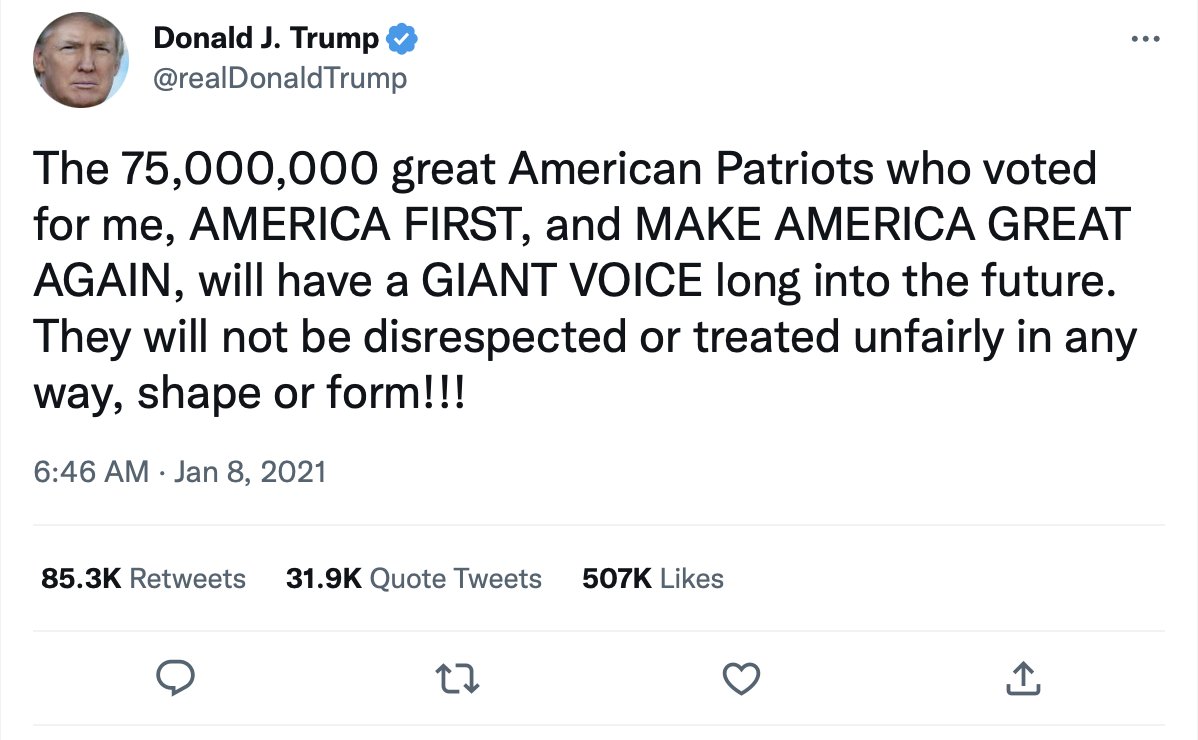
By the next day, employees expressed eagerness to tackle “medical misinformation” as soon as possible.
Looking back, this can hardly surprise anyone.
In sharp contrast, here’s what Twitter allowed world leaders (who weren’t orange) to tweet in the past:
In June 2018, Iran’s Ayatollah Ali Khamenei tweeted, “#Israel is a malignant cancerous tumor in the West Asian region that has to be removed and eradicated: it is possible and it will happen.” Twitter neither deleted the tweet nor banned the Ayatollah.
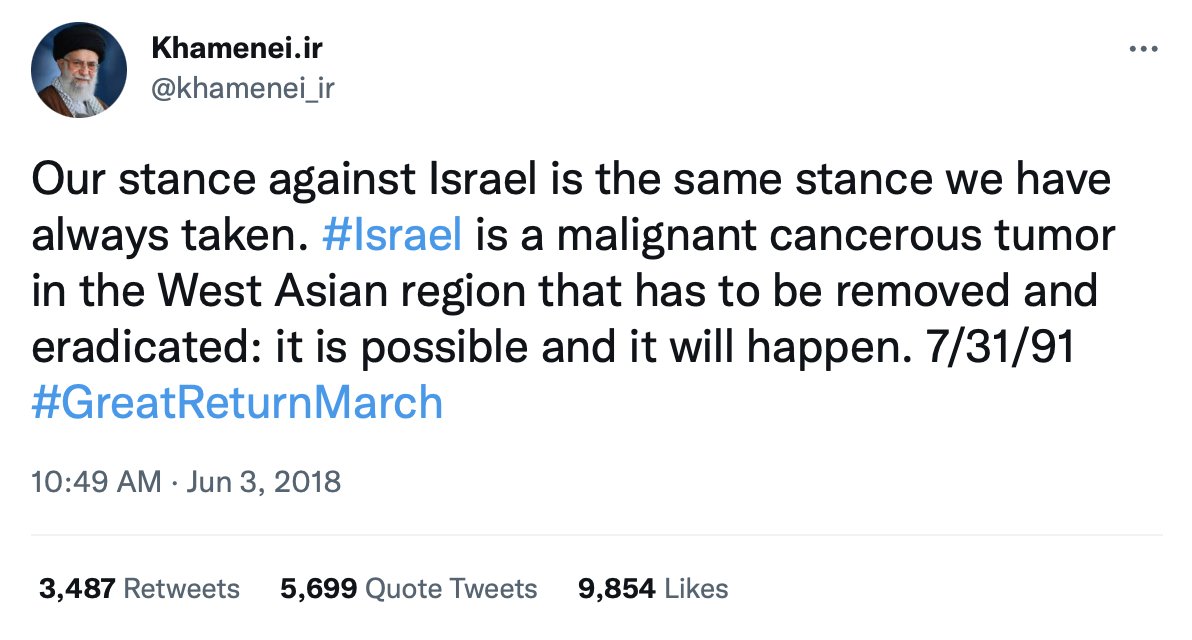
In October 2020, the former Malaysian Prime Minister said it was “a right” for Muslims to “kill millions of French people.” Twitter deleted his tweet for “glorifying violence,” but he remains on the platform.
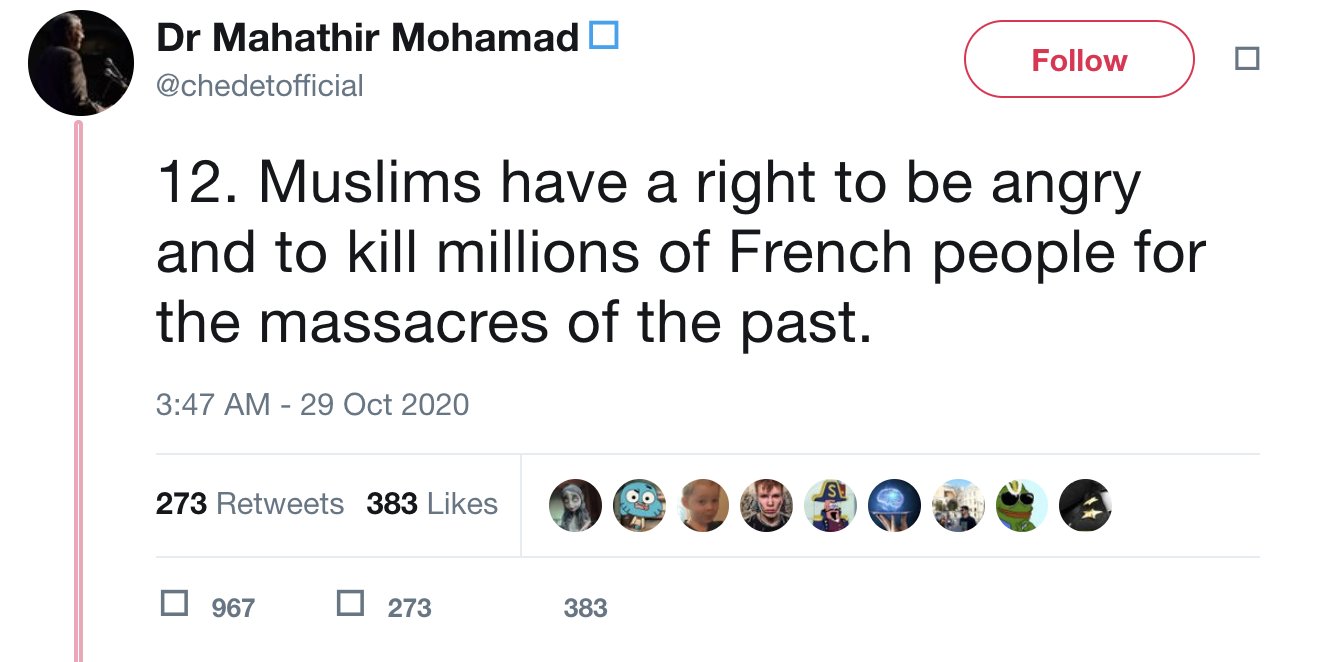
In October 2021, Twitter allowed Ethiopian Prime Minister Abiy Ahmed to call on citizens to take up arms against the Tigray region. Twitter allowed the tweet to remain up, and did not ban the prime minister.
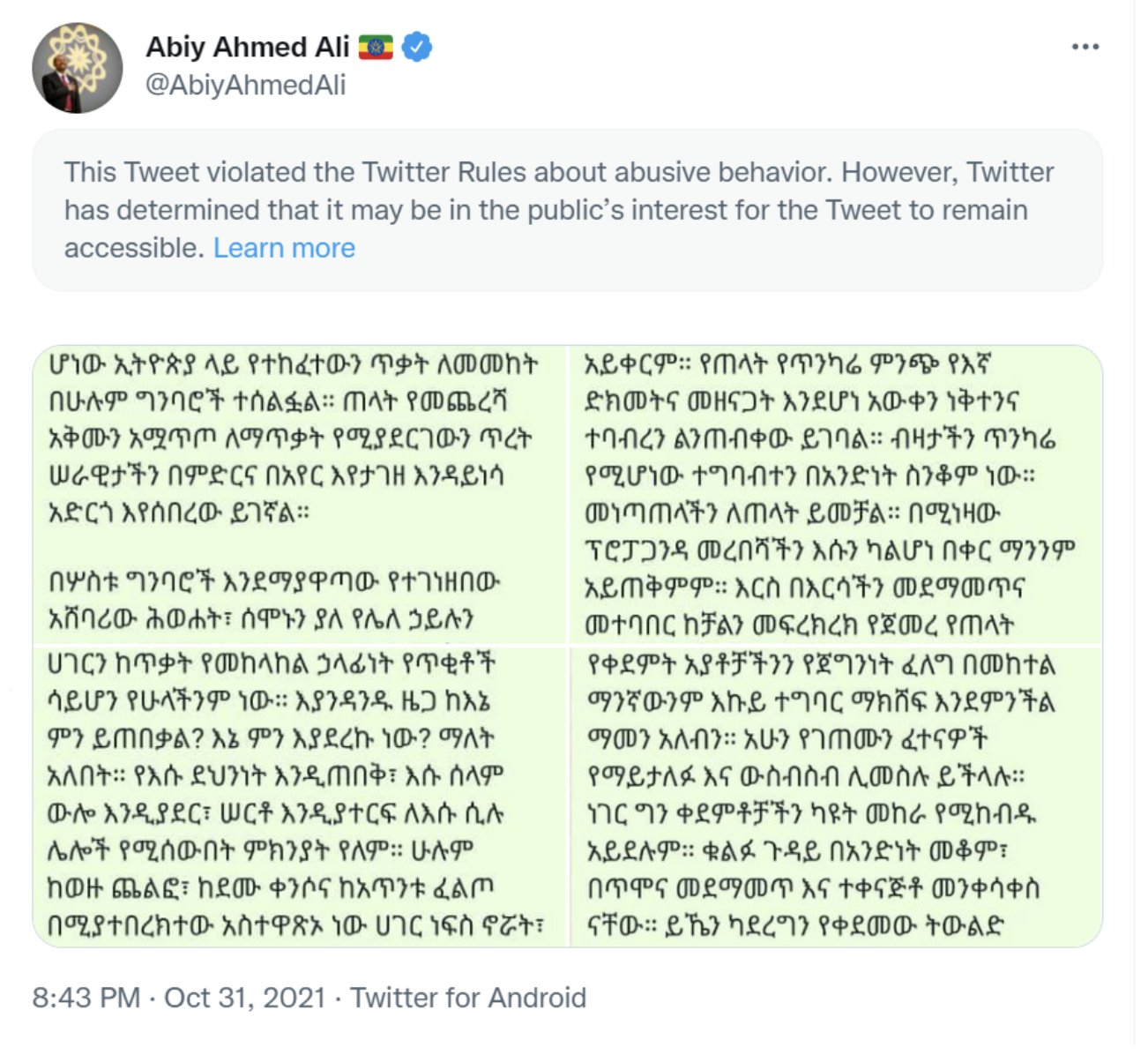
And there are, of course, many more examples.
For what it’s worth, some Twitter employees saw the injustice – and the problem for democracy in their country – inherent in this.
The only serious concern we found expressed within Twitter over the implications for free speech and democracy of banning Trump came from a junior person in the organization. It was tucked away in a lower-level Slack channel known as “site-integrity-auto”. “This might be an unpopular opinion but one off ad hoc decisions like this that don’t appear rooted in policy are imho a slippery slope… This now appears to be a fiat by an online platform CEO with a global presence that can gatekeep speech for the entire world…”
“Maybe because I am from China,” said one employee on January 7, “I deeply understand how censorship can destroy the public conversation.”
Of course, world leaders also objected. For obvious reasons.
Outside the United States, Twitter’s decision to ban Trump raised alarms, including with French President Emmanuel Macron, German Prime Minister Angela Merkel, and Mexico’s President Andres Manuel Lopez Obrador.
Macron told an audience he didn’t “want to live in a democracy where the key decisions” were made by private players. “I want it to be decided by a law voted by your representative, or by regulation, governance, democratically discussed and approved by democratic leaders.”
Merkel’s spokesperson called Twitter’s decision to ban Trump from its platform “problematic” and added that the freedom of opinion is of “elementary significance.”
Russian opposition leader Alexey Navalny criticized the ban as “an unacceptable act of censorship.”
Listener Feedback
On the forum, Evgeny Kuznetsov says:
So glad to be commuting with TPC again!
Today I learned about how “the fourth estate” in English is about all those British estates and things. In Russian (and, AFAIK, in some other languages) it’s “четвёртая власть” [t͡ɕɪtˈvʲɵrtəjə vɫasʲtʲ], literally “the fourth power”, and refers to the branches of government, the first three being Legislative, Executive and Judicial. In Russian sources it is a common concept (usually attributed to Jean-Jacques Rousseau, although I haven’t been able to find any direct quotes) that for a society to be democratic it’s vital that the main three branches of government are separated so that no two powers are in the same hands and they balance each other neatly. I don’t know if this separation of powers is actually required and/or enough to make a democracy, but I know in today’s Russia all four branches are effectively in the same hands, and it doesn’t look even close to a democracy here.
Arguably, the press (or better yet, journalism) is equally powerful, and equally needs to be in separate hands.
Following this, astralc commented:
“I Ate’nt Dead” – Good to hear that, Fabian Weatherwax.
Your story about the car breaking down made think about the next part will be that it “burn down, fell over, then sank into the swamp”, like the Monty Python quote. Hope that rest of the year will be better, and the police is not after you because some other reasons (so you won’t get epsteined like Boeing whisleblower).
And indiacharlie also expressed happiness at having the podcast back on the airwaves.
Credits
First and foremost, I would like to thank everybody who provided feedback on this or previous episodes. You are very important to the continued success of this podcast!
This podcast is provided free of charge and free of obligations under the value-for-value model. However, as a freelance journalist volunteering my time to produce this show, I need your support. If you like my work and want to make sure The Private Citizen keeps going, please consider joining my Patreon.
Showrunners
—
Executive Producers
- Butterbeans
- Jaroslav Lichtblau
- Michael Mullan-Jensen
- Rizele
- Sandman616
- Sir Galteran
Supervising Producers
avis, Bennett Piater, Dave, ikn, krunkle, Tobias Weber
Producers
Andrew Davidson, astralc, Cam, Captain Egghead, Dirk Dede, Fadi Mansour, Florian Pigorsch, Joe Poser, MrAmish, RJ Tracey, Robert Forster
Associate Producers
Jonathan, Juhan Sonin, Kai Siers, RikyM, Steve Hoos, Vlad
Thanks to Bytemark, who are providing the hosting and bandwidth for this episode’s audio file. Podcast cover art photo by GegenWind.
Music
Today, I’m ending the show with the song Never Return by Carvings.
